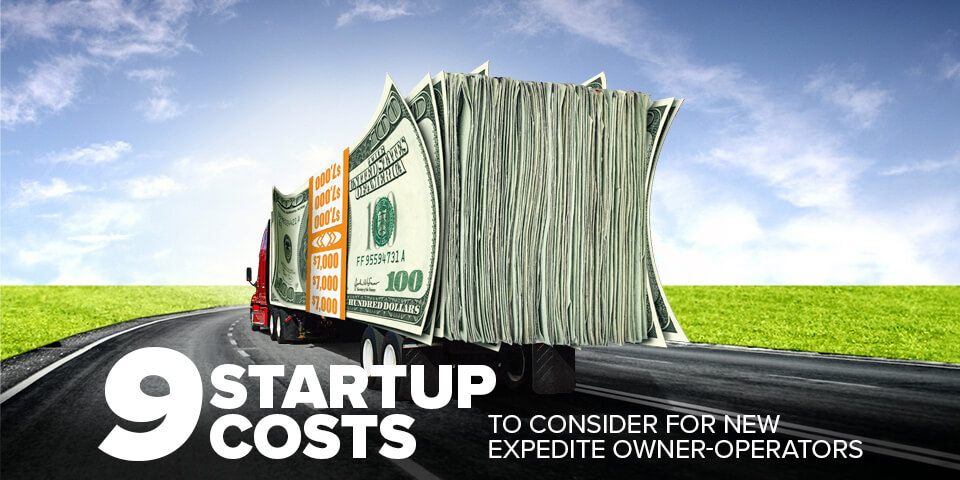In The News

9 Startup Costs to Consider for New Expedite Owner-Operators
You want to become an expedite owner-operator to launch a new career, see the country, and take charge of your financial future. But if you overlook significant start-up expenses, you’ll put yourself (and your health) under a lot of stress as you struggle to pay the bills and keep your dream alive.
So, avoid unpleasant surprises by making sure you can cover all your startup costs before diving into the expedite lifestyle.
1. Carrier Costs
When you’re planning your startup costs as an owner-operator, the first step is to evaluate which carrier you’re considering leasing onto.
This is because some carriers might require that your truck is equipped with a liftgate or that you purchase pads, blankets, load bars, straps, pallet jack.
Some carriers will pay your expenses during orientation; some will not.
And what about insurance? Do you need to get your own insurance? Or, can you be added to the carrier’s policy? Is there a deposit required?
So, determine what’s required by your carriers and factor those expenses into your startup costs.
2. Truck & Equipment
What size vehicle are you planning on operating? A new Freightliner Sprinter van ranges from $45,000 to $65,000, depending on how it’s equipped. A new expediter straight truck with sleeper costs around $175,000 to over $225,000. Assuming you’re financing the vehicle, include the down payment and first month’s payment in your startup costs.
3. Credentials
This category includes costs for commercial driver’s license (CDL), certifications (Hazmat, TSA, etc.), and health card, depending on the size truck or van you run.
4. Electronic Devices/ Software
What mobile devices do you need to run your business? Do you already have a laptop or will you need to invest in one? What about bookkeeping or accounting software?
Also, consider any upfront costs associated with wireless Internet access when you’re on the road. You can use your smartphone as a wireless hotspot, but that might require additional monthly expenses for data usage, depending on your plan.
You also might want to invest in a GPS system with hazmat routing and other trucking-specific capabilities.
5. Truck Insurance
You can purchase insurance through most trucking carriers, but you might want to shop around with independent insurance providers, as well, to ensure you’re getting the best deal.
6. Occupational Accident Insurance
This insurance covers medical, disability, death, and dismemberment benefits for accidents that occur on the job. For teams, you must purchase policies for both drivers. Premiums range from $200 to $300 or moreper month. So, once you know how much your premium will be, include the first payment in your startup costs.
7. Medical Insurance
As an owner-operator, you don’t have insurance through your employer. Those costs are on you. So, factor in any upfront premiums with your other startup costs.
8. Clothing and Uniforms
What clothing will you need to purchase upfront for your business?
Clothing and uniforms will vary from carrier to carrier.
But even if the company does not require a uniform, you’ll still need to purchase clothing for your work.
You’ll also have other potential clothing cost considerations, such as:
- Steel toe shoes.
- Safety vests.
- Safety glasses.
- Hard hat.
9. Cash Reserves
You’re going to have uneven cash flow, especially at the start. How do you smooth the gaps?
That’s where your cash reserves come in. So, keep these questions in mind when calculating your cash reserves requirements into your startup costs:
- Do you have resources in case of a truck breakdown?
- Will the carrier set up an escrow account for truck breakdowns?
- If so, who controls when you can take money out of it?
- Do you have enough cash in reserves to run for two weeks (or until you get your first paycheck)?
The Bottom Line
These nine points give you an overview of what to factor into your startup costs. But before taking the plunge as an owner-operator, consult with your financial advisor and other expediters to ensure you’ve covered all your bases—to avoid unpleasant surprises and put yourself and your family on the road to long-term success.
